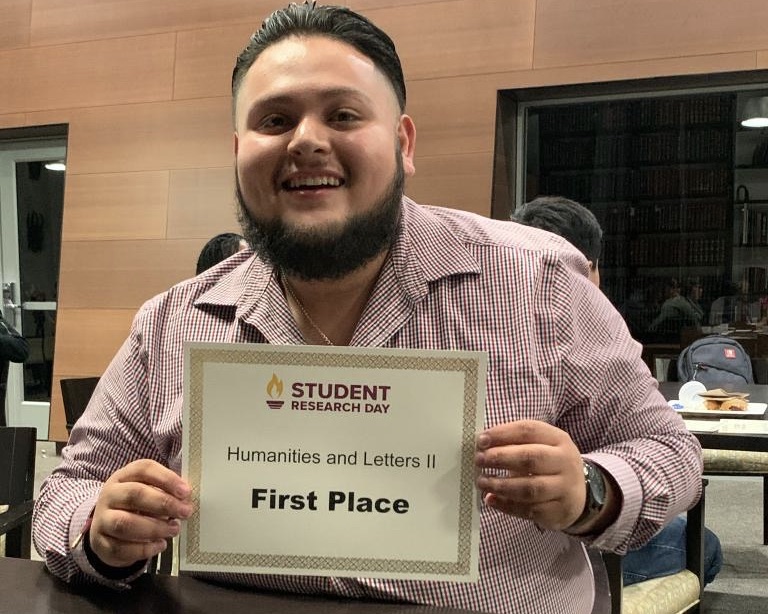Photo courtesy of Brian Cantero.
By Destiny Torres, Arts & Lifestyle Editor
Growing up in South Los Angeles, Bryan Cantero listened to a vast variety of music, but growing up in a Mexican household, the music that filled the walls of his home have always been corridos, traditional Mexican folk ballads.
Cantero is a senior at CSUDH who won first place at this year’s Student Research Day (SRD) where his research focused on corridos and “corrido culture,” emphasizing that it is more than just a form of Mexican music and that it helps young men in college stay in school.
His passion and love for corridos has led his life to go in different directions in his academic career. He always knew that whatever he ended up doing, he wanted to work in the corrido scene.
As a first-generation freshman, he started off at CSUDH as a communications major. His plan was to work with corrido artists doing management and public relations.
This was until he took his first Chicano/a studies course with Dr. Benavides López where he enjoyed the discussions that were relatable to his own experiences. After some hesitation, he went ahead and changed his major to Chicano/a studies with a minor in sociology.
With his degree in Chicano/a studies, he hopes to insert himself in academics and become a professor to help more students like himself and become a voice for people of color in academia, a community that heavily lacks diversity.
Over time, Cantero worked closely with López as she constantly checked in with him to see how he was managing. He would always discuss corridos and his admiration for the genre and scene. Cantero said he listens to corridos in the car, on the way to school, in between classes and at home. Whenever he needs a push, corridos have been able to give him motivation.
“I draw a lot of my knowledge and my ganas, or resilience, from the lyrics in corridos,” Catero said.
One day, she asked him if he would like to do research on corridos, an idea that Cantero didn’t think was possible.
“Coming into college from high school is a culture shock, so how do we facilitate that through culturally relevant services and events,” Cantero said.
In the last few years, CSUDH has hosted events for the Dia de Los Muertos celebration. There, Cantero discovered the group of young men performing corridos and felt inspired by the big turnout it caused.
“Seeing that really big turnout of students taking up space and enacting their cultural citizenship, something clicked,” Cantero said.

Photo courtesy of Bryan Cantero.
With López as his mentor, Cantero began conducting his research through the McNair Scholars program which supports and funds first-generation and underrepresented students in order to prepare them for their future doctoral studies. Cantero said the McNair program has been the most helpful in not only funding his ideas but believing in them.
“My work looks at how we utilize corridos as a tool to integrate Mexican-American males into college campuses,” Cantero said.
His research focused on a young corrido group in which each member attended a university in California, which inspired Cantero to look at how “corrido culture” contributed to the men continuing with their higher education.
“How do you incorporate that knowledge into the navigation of higher-ed, or what does it look like for those students to be able to perform on different college campuses,” Cantero said. “I looked at how visibility can drastically change the educational experience of students.”
Seeing young people his age at corrido events, he began to see that they were a much bigger phenomenon. This led him to question how college campuses can better serve the cultural needs of students.
Cantero said he listens to corridos in the car, on the way to school, in between classes and at home. Whenever he needs a push, corridos have been able to give him motivation.
“I draw a lot of my knowledge and my ganas, or resilience, from the lyrics in corridos,” Catero said.
In times when life has gotten too overwhelming, Cantero said the lyrics in corridos have motivated him to push through the difficult times. He said this is what pushed him to continue his academic journey at CSUDH, no matter how many times he wanted to quit.
“I don’t know how many times I’ve been like, ‘man, I’m tired,’ but I remember that there’s a bigger picture other than myself and it has enabled me to stay and keep going,” Cantero said.
Besides SRD, he has presented many times including for the American Association of Hispanics in Higher-Ed and at the University of California, San Diego. He was also selected for a state-wide competition scheduled to happen this year and was invited to present at the National Association of Chicano/a Studies Conference held in Seattle, Washington.
“Having the community that I made here at [CSUDH] be there… means a lot,” Cantero said. “Sometimes they’re more excited about my work than I am for myself, but it helps.”
Cantero has been busy applying to graduate schools. Even though he has already been accepted into the doctorate program at the University of New Mexico and the master’s program at CSU Los Angeles, he is still awaiting answers from other universities.
“I’m tired of having to quote people who I don’t think are fit to talk about corridos, how do you know anything about the culture or anything that is going on,” Cantero said. “It speaks on how white the academy is.”

